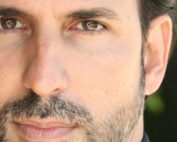TITLE:
A Golden State
SUB-TITLE:
Steven Villescas, Jr., is using the power of his voice to help pay for college but learning how to speak up will guide him for life.
AUTHOR:
HealthyMente Staff
STORY:
If speech is free in America, why aren’t more young Latinos speaking up? The better question is why aren’t they learning how to do so effectively? It’s one thing to voice one’s opinion, and it’s quite another to do it in a way that others will listen. Could it have something to do with cultural or community expectations? College student Steven Villescas, Jr., who has spent the last two years working on perfecting his public speaking abilities, thinks so.
Steven was born and raised in Whittier, California, a city of 85,000 a dozen miles southeast of Los Angeles where the Hispanic population tops 65%. His earliest memory of being aware of his Latino identity was in grade school. He recalls asking a classmate named David if he was Mexican American like him. David replied that he wasn’t and believed his family was German. Perplexed, Steven insisted that David “must have a little Mexican in him.” Nope. David maintained he was Anglo. Steven says, “I guess you could say the first time I realized that I was of Latin descent was when I was talking to someone who wasn’t.”
As a Mexican American, Steven is the first to admit he has not faced much blatant ethnic discrimination. A lot of this has to do with the Golden State’s high Hispanic population. However, Steven does acknowledge that cultural realities within the Mexican American community itself may have a strong influence on how young Latinos see themselves and what they can achieve academically and professionally. Hispanic academic achievers can be hard to come by. The good news is that the percentage of Hispanic students heading to college has skyrocketed, surpassing that of white classmates for the first time. This is perhaps due to studies showing that Latino families put a big emphasis on education and the availability of scholarships. The reality, however, is that Latinos going to college in big numbers is a fairly new phenomenon and these students are often charting a new course for their family.
One area where Latinos are scarce is in public speaking, more specifically in forensics, the academic term for competitive speech and debate. Forensics is offered in most high schools as well as at the college-level. Much like a sports team, forensics teams represent their schools at regional and national tournaments, competing in different types of speeches and debates for judges. Forensics coaches work with the competitors, building their skills and increasing self-confidence. The activity has definitely paid off for thousands of people who have discovered their voice and learned how to use it. Former competitors include Oprah Winfrey, veteran journalists Jane Pauley and Tom Brokaw, the late movie critic Roger Ebert, and world leaders like United Nations Secretary General Kofi Annan, U.S. Attorney General Janet Reno, British Prime Ministers Margaret Thatcher and John Major as well as Nelson Mandela. Entertainers who have competed in forensics include R.E.M singer Michael Stipe, CCH Pounder, Jim Belushi, James Dean, Kelsey Grammar, Arsenio Hall, Steve Buscemi, William H. Macy, Shelley Long, Brent Spiner, and the voice of Bart Simpson Nancy Cartright. Anthony Zuiker who competed in speech for Arizona State University created CSI: Crime Scene Investigation, CSI: Miami and CSI: New York. CSI: Crime Scene Investigation’s supervising producer is Dustin Lee Abraham, a national speech champion for ASU. It’s perhaps also worth noting that Sonia Sotomayer, the first U.S. Supreme Court Justice of Hispanic heritage, was on her high school’s forensics team.
One area where Latinos are scarce is in public speaking, more specifically in forensics, the academic term for competitive speech and debate. Forensics is offered in most high schools as well as at the college-level. Much like a sports team, forensics teams represent their schools at regional and national tournaments, competing in different types of speeches and debates for judges. Forensics coaches work with the competitors, building their skills and increasing self-confidence. The activity has definitely paid off for thousands of people who have discovered their voice and learned how to use it. Former competitors include Oprah Winfrey, veteran journalists Jane Pauley and Tom Brokaw, the late movie critic Roger Ebert, and world leaders like United Nations Secretary General Kofi Annan, U.S. Attorney General Janet Reno, British Prime Ministers Margaret Thatcher and John Major as well as Nelson Mandela. Entertainers who have competed in forensics include R.E.M singer Michael Stipe, CCH Pounder, Jim Belushi, James Dean, Kelsey Grammar, Arsenio Hall, Steve Buscemi, William H. Macy, Shelley Long, Brent Spiner, and the voice of Bart Simpson Nancy Cartright. Anthony Zuiker who competed in speech for Arizona State University created CSI: Crime Scene Investigation, CSI: Miami and CSI: New York. CSI: Crime Scene Investigation’s supervising producer is Dustin Lee Abraham, a national speech champion for ASU. It’s perhaps also worth noting that Sonia Sotomayer, the first U.S. Supreme Court Justice of Hispanic heritage, was on her high school’s forensics team.
Yet, despite the fact that forensics is a bridge to a brighter future, Latinos are woefully underrepresented. When Steven advanced to the final round in Prose Interpretation at the community college national speech tournament last year, he was the first student in (predominantly Hispanic) Rio Hondo College’s history to do so. Steven would take home the Gold. It was not a fluke. Rather, it was a culmination of countless hours of hard work, unyielding determination and genuine sacrifice.
Steven is the first person in his family to go to college and wasn’t quite certain what to expect. After a period of academic uncertainty, a speech teacher encouraged him to join the college’s forensics team. Forensics provided Steven with an immediate focus. He started working with coaches and winning trophies, became captain of the team, and built a network of inspiring people who now champion him.
In preparation for a speech involving a Harley-Davidson motorcycle, Steven went riding with Battlestar Galactica star Tricia Helfer and her husband attorney Jonathan Marshall. After Emmy nominated actress Carolyn Hennesy who plays Mrs. Chesterfield on Disney’s Jessie heard Steven speak at a school showcase, she immediately offered him a scholarship. He’s also received scholarship support from fellow East LA native Marisa Ramirez, who stars as Det. Maria Baez on CBS’ hit show Blue Bloods.
Despite this success, Steven is very aware that pursuing Speech and Debate instead of sports or other more traditional activities is out of step with community expectations. Steven says, “In my experience, the Latino community isn’t always comfortable with the unknown. We’re more inclined to stick to what we know rather than venture out. And if we do and fail, we get made fun of or put down for it.” Despite this, he says it’s important to “keep moving forward” and to “feel confident in what you’ve decided for yourself.” Steven didn’t come by this insight overnight. Instead, he sought out mentors and teachers who recognized his gifts and encouraged him to persevere. He also began seeing the results of his hard work, which gave him even more confidence to keep going.
For Steven, moving forward has also meant moving away from home for the first time. With a pile of recommendation letters (including one from the division dean of his college) several universities courted Steven with transfer opportunities. But when the University of Texas at Austin offered him a prestigious Speech scholarship, he was elated. After all, UT boasts one of the best Communication Studies programs in the nation. It also meant competing for Texas Speech, the powerhouse UT forensics team.
So what advice does Steven have for other young Latinos who want to pursue forensics or have similar aspirations, but are feeling a little lost? “First,” he says, “Embrace it. Allow yourself the opportunity to ask yourself why you feel lost. Finding yourself or purpose, whether it is for life or for the next two minutes, is what I would equate to some sort of birth, except this time you’re conscious and remember everything. Finding purpose, especially after feeling lost puts life back into your life, and that only happens once we start to ask ourselves the questions we might not be so comfortable thinking about.” For those young people who don’t have a lot support from a parent or guardian, Steven recommends identifying a teacher or professional person who you admire and aspire to be like. Then, ask them how they became successful and if they have any advice for how you can also find success. You might be surprised at how much help they are willing to offer. After all, everyone needs help at some point and teachers are especially open to helping to guide students who show the desire to achieve.
Steven also encourages young Latinos to constantly re-evaluate. “Ask yourself if you are where you want to be,” he says. “If you aren’t, you have the chance to do something about it, do some exploring. Start talking to people. Build your network. Studies show that more often than not, acquaintances are the reason for that new job, hobby, or even relationship!”
The bottom line, however, is to be true to yourself. He says, “Believe in yourself. Trust yourself and don’t be afraid to follow your heart no matter what. Never let other people’s fears become your own.”
Now that’s some advice worth its weight in gold.
If you’re ready to speak up, see if your school has a Speech and/or Debate team or club. Also, be sure to check out these web sites for more information on how you can get involved in Speech & Debate (forensics).
High School Students
- SpeechandDebate.org
- Voice of Democracy Contest
- Model United Nations
- American Legion Oratorical Contest
- Optimist Int’l Oratorical Contest
Community College
4-year College & Universities
Marisa Ramirez
“Dr. Shirley’s HealthMente is amazing! Fearlessly talking about relevant, sometimes tough issues our community needs to face.” Blue Blood’s star Marisa Ramirez
Mia St. John
"So glad to support HealthyMente.com El Saber es Poder!”
Oscar Torre
“Latinos are a lot more diverse than what the census would lead most American to believe. What seems to be a common denominator, however, is our reluctance to discuss mental health issues. This has got to change if the next generation of Latinos is to be successful. HealthyMente.com opens up the conversation.”




